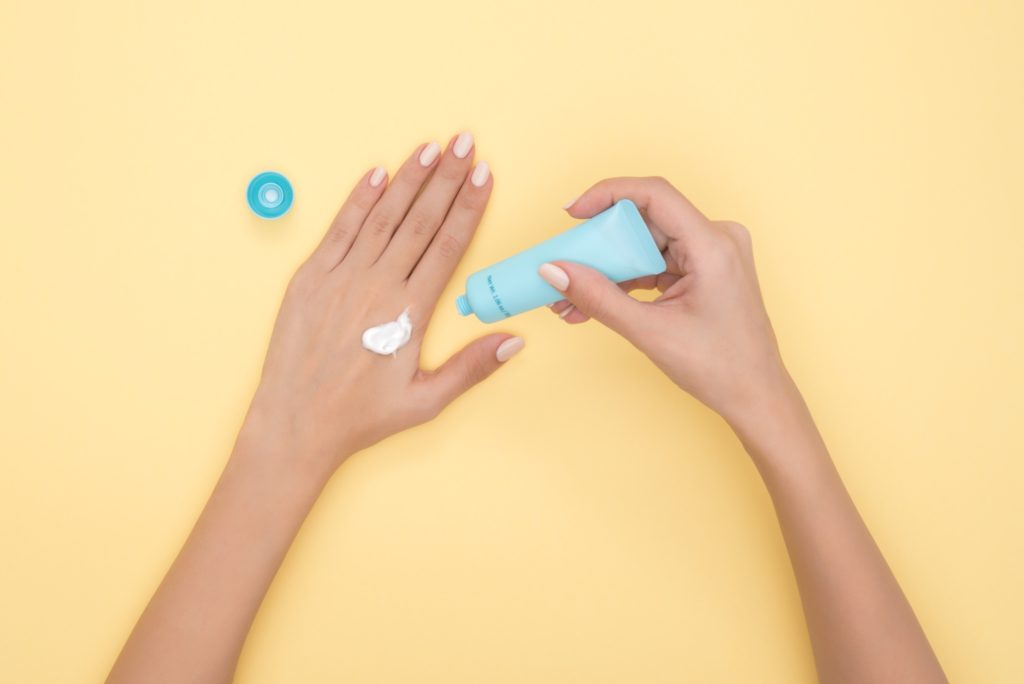Table of Contents
Your skin type is determined by a variety of factors, such as your genes, hormones, medications, and external environment. These can impact the sensitivity, oiliness, and elasticity of your skin, giving it unique properties that may require more specialized care.
Skincare needs vary from one person to the next, which is why it’s important to understand your complexion and how you can keep it healthy. Adjust your regimen accordingly, and make sure you only use skincare products that are best suited for your unique needs.
Read on to learn about the four primary skin types and how you can properly care for each one:

Well-Balanced Skin
If your skin produces a healthy amount of oil and is naturally less prone to acne and premature aging, you likely have ‘normal’ or well-balanced skin. While well-balanced skin is ideal, a clear complexion doesn’t mean you should skimp on your skincare routine. Preventing skin conditions is much easier than treating them.
If you’re lucky enough to have a normal complexion, you should still follow a consistent beauty routine to ensure you maintain a healthy and hydrated complexion. Each night, use a gentle cleanser to remove any dirt or makeup that may have built up throughout the day. Then, follow with an antioxidant serum that’s rich in ingredients like vitamin C and hydroquinone to give your skin a boost of nourishment.
For an added layer of protection, consider using a daily moisturizer that contains SPF to strengthen your skin’s defense against harsh weather conditions and potential sun damage. Remember that it’s better to be proactive rather than reactive when it comes to your skin.
Dry Skin
Dry skin tends to produce less oil, making it more prone to flakiness, irritation, and premature aging. These conditions may be exacerbated by harsh chemicals found in skincare products like salicylic acid, benzoyl peroxide, alcohol, and AHAs. External conditions, such as the weather, wind, and central heating can also further irritate your skin.
If you’re prone to dry or flaky skin, consider using a thicker moisturizer that contains ingredients like phospholipids, cholesterol, and fatty acids to help reduce and prevent irritation. Accompany this with products that contain hyaluronic acid, which offer intense hydration and promote a plumper and more supple complexion.
Furthermore, using an anti-aging cream in conjunction with your daily moisturizer can also reverse signs of premature aging and help reduce the appearance of fine lines and wrinkles. Be sure to use an anti-aging formula that also contains collagen, which promotes skin elasticity and structure.
Oily Skin
Your skin naturally produces sebum, which protects and hydrates your complexion. If your glands produce too much sebum, you may have oily skin. Over time, excess sebum, sweat, and dirt can build up on your skin, making you more prone to blackheads and acne. It can also give your face a shiny or greasy appearance.
If you have a particularly oily complexion, you may need to wash your face more often to keep your pores clear. Practice regular exfoliation, and consider adding a liquid astringent to your daily routine to tighten pores and reduce oil secretion.
In addition, you should avoid touching your face as this can trigger oil production, further clog pores, and lead to breakouts. Instead, gently pat your face with oil-absorbing pads to soak up excess sebum and to keep your face shine-free.
Combination Skin
If your skin is dry in some areas and oily in others, it’s likely that you have combination skin. Combination skin can be more difficult to treat because you may be battling several conflicting skin concerns at once. For instance, you may have an oily t-zone (forehead, nose, and chin), but a dry complexion everywhere else. This can make it tricky to determine what your skin really needs.
Instead of following a rigid skincare routine, assess your skin each morning to determine which skincare products you should use. Some days, you may need to add a lightweight moisturizer to your routine while on others, your skin may not need the extra boost of hydration.
Additionally, multi-masking is effective for combination skin as it allows you to target and treat specific areas of your face. Rather than using a single product to address only half your concerns, try using a mattifying mask on your nose and forehead, and a hydrating mask on the rest of your face. By multi-masking, you can ensure you’re tending to all your skincare needs at once.
Concluding Thoughts
While these tips provide insight into ways you can address your skincare concerns, there’s no single solution for flawless skin. The right treatment for you will depend on a variety of factors. That’s why it’s best to consult your dermatologist to help determine the best solution for your specific needs.















